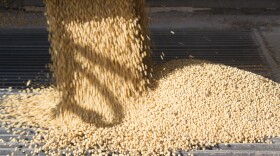
Amy Mayer
Amy Mayer is a reporter based in Ames. She covers agriculture and is part of the Harvest Public Media collaboration. Amy worked as an independent producer for many years and also previously had stints as weekend news host and reporter at WFCR in Amherst, Massachusetts and as a reporter and host/producer of a weekly call-in health show at KUAC in Fairbanks, Alaska. Amy’s work has earned awards from SPJ, the Alaska Press Club and the Massachusetts/Rhode Island AP. Her stories have aired on NPR news programs such as Morning Edition, All Things Considered and Weekend Edition and on Only A Game, Marketplace and Living on Earth. She produced the 2011 documentary Peace Corps Voices, which aired in over 160 communities across the country and has written for The New York Times, Boston Globe, Real Simple and other print outlets. Amy served on the board of directors of the Association of Independents in Radio from 2008-2015.
Amy has a bachelor’s degree in Latin American Studies from Wellesley College and a master’s degree from the Graduate School of Journalism at the University of California, Berkeley.
Amy’s favorite public radio program is The World.
-
Sea otters were hunted to near extinction along the U.S. West Coast. During the century they have been away, a lucrative shellfish industry has grown in the waters where restoration would take place.
-
Winters are warming faster than summers in many places, and colder parts of the U.S. are warming faster than hotter ones. The warming winter climate has year-round consequences across the country.
-
American farmers rely heavily on selling their goods overseas. As the trade war heats up again, many Midwest soybean farmers have huge surpluses and are receiving government aid.
-
One farmer says he has seen hog prices drop to the point where it may cost some farmers more to raise a pig than they can sell it for — and he worries about lower sales.
-
High demand, bird flu and insecticides have all driven prices higher, but there is a sunny side: U.S. producers appear to be increasing the size of their laying flocks, which may push costs down.
-
President Trump's nominee for chief scientist at the Department of Agriculture is drawing scrutiny and skepticism in part because the nominee doesn't have a scientific background.
-
Sam Clovis has a doctorate in public administration, is skeptical that humans have a role in climate change and pushed theories suggesting former President Barack Obama was born in Kenya.
-
Some farmers are grazing different types of animals on the same land in a carefully controlled pattern, which ideally will enhance animal welfare and also help regenerate the landscape.
-
The people working on farms and elsewhere in agriculture often don't reflect the nation's demographics. Changing that is becoming a priority, in hopes that new people will bring fresh ideas.
-
Because of unstable milk prices, small-dairy owners are also selling artisanal cheeses to help them stay afloat. The idea is catching on — in Iowa, the number of on-farm cheese-makers has doubled.








